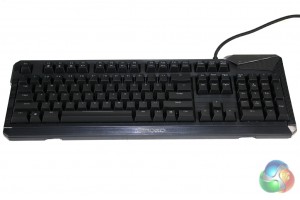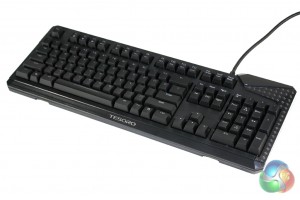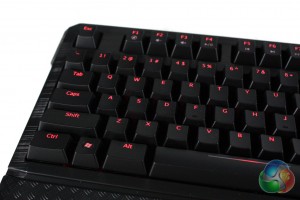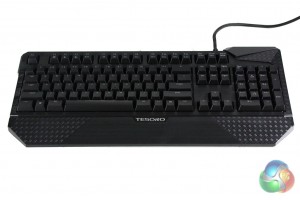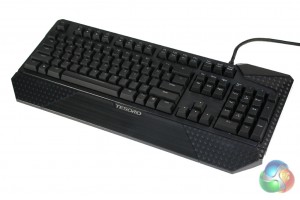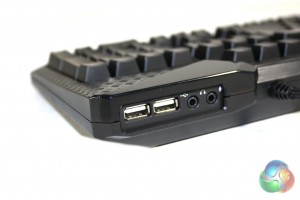It is quite clear from the design of the Durandal G1NL that it is targeted at gamers, with various angular design cues and LED backlighting. While the finish of the keyboard may initially appear like brushed aluminium, it is actually just textured plastic. This looks a little cheap when compared to aluminium offerings from the likes of Corsair and CM Storm.
Although we could not describe the build quality of the Durandal G1NL as bad, it does not have the same quality feel as a number of competing models which are finished in metal. The keyboard is pretty weighty, though, and is resistant to flexing under pressure so we would not be surprised if there were some kind of metal skeleton inside the plastic casing.
Like all high-end gaming keyboards these days, the Durandal G1NL features LED backlighting. We are restricted to red lighting with this model which is sure to appeal to a wide audience of gamers. The ‘8' and ‘2' key on the number pad have a second function of adjusting the brightness of the LED backlighting. There is also a ‘breathing' mode which we are not particularly fond of but may appeal to some users.
Along the top edge of the keyboard we find the F1 – F12 buttons in the usual place. These all have second functions attributed to them – with F1 to F6 representing multimedia functions, F7 to F11 representing hot keys to switch between macro profiles and F12 enabling gaming mode (disabling the Windows button).
As we mentioned earlier, the Durandal G1NL is supplied with a palm rest which clips on to the front of the unit. They key bed rests quite high above the surface of the desk, so we found it more comfortable to use the keyboard with this palm rest in place.
We find a two port USB2.0 hub on the back edge of the keyboard, alongside headphone and microphone pass through 3.5mm jacks.
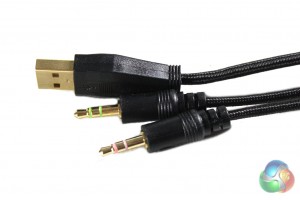
Tesoro have chosen to braid the cable, which reflects the premium nature of this model. The cable itself breaks out into a USB connector and two 3.5 mm connectors at the end. The USB connector supports the inbuilt hub as well as the keyboard functionality, with the two 3.5mm connections simply acting as pass-throughs to the jacks in the keyboard.
 KitGuru KitGuru.net – Tech News | Hardware News | Hardware Reviews | IOS | Mobile | Gaming | Graphics Cards
KitGuru KitGuru.net – Tech News | Hardware News | Hardware Reviews | IOS | Mobile | Gaming | Graphics Cards


